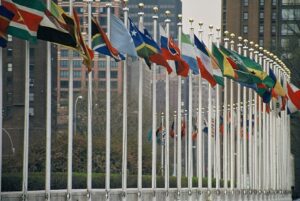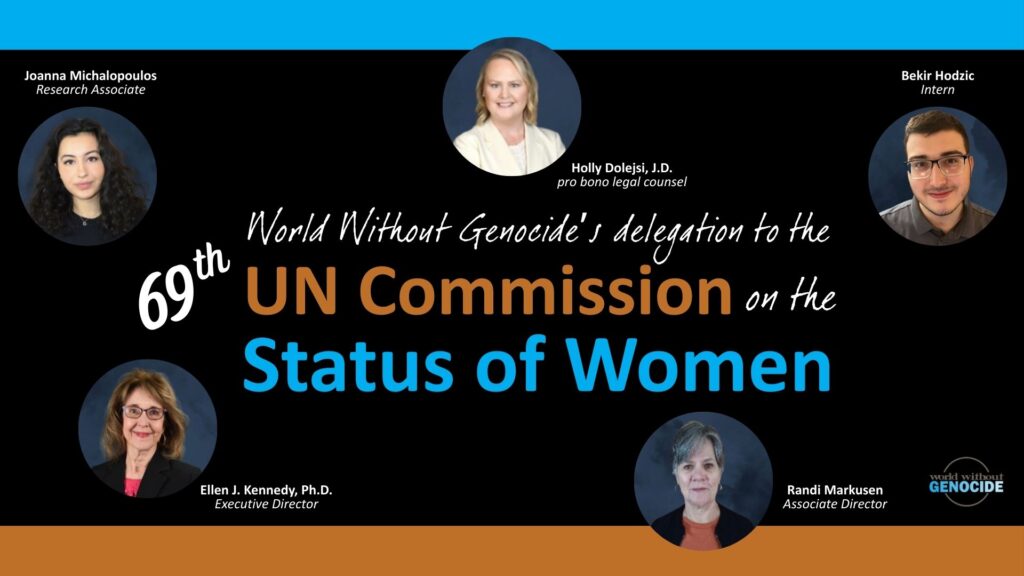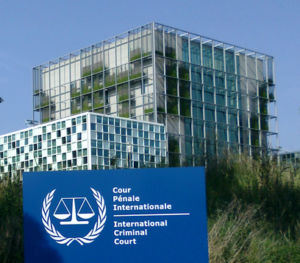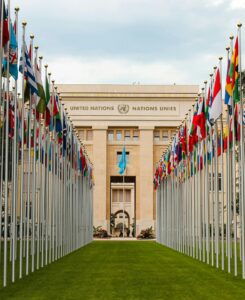Our Global Reach for Human Rights:
The United Nations, the International Criminal Court, and Other Venues

UN Members flags outside UN headquarters, New York. Image courtesy of “I, Aotearoa” is unmodified and licensed under CC BY-SA 3.0.
United Nations (UN)
World Without Genocide (World) is in Special Consultative status with the UN Economic and Social Council (ECOSOC) since 2022. Special Consultative Status describes a relationship granted to non-governmental organizations (NGOs) with a strong competence in fields addressed by ECOSOC, including human rights, sustainable development, peace-building, humanitarian aid, conflict prevention, and more.
This status allows us to attend and participate in UN meetings and events, submit written statements and make oral presentations to ECOSOC, provide input on relevant issues, and host side events at UN meetings.
Ellen J. Kennedy, Ph.D., World’s Executive Director, is a representative to the United Nations Department of Global Communications. This status also allows World to participate in UN events and activities, including contributing towards global UN initiatives.
Human Rights Council (HRC) and the Universal Periodic Review (UPR)
The HRC is a UN body with 47 member states elected by the General Assembly. The Council’s purpose is to protect human rights globally and it addresses country-specific and thematic human rights issues. The HRC reviews each of the 193 UN member states every 4.5 years on their policies and practices regarding human rights. This review is called a Universal Periodic Review (UPR).
The UPR is a peer-review process in which HRC members assess and make recommendations on a state’s human rights obligations. The state self-reports its progress towards previous UPR recommendations. Civil society organizations can provide supplementary information in a Shadow Report about the state’s human rights record. The Shadow Reporting process is a critical piece of the UPR: it highlights issues not acknowledged in the state report, and it gives a platform for civil society to have a voice.
In April 2025, a World Without Genocide-led coalition submitted a Shadow Report, The United States Abridges the Human Right to Bodily Autonomy, to the UN Human Rights Council for the 50th Session Universal Periodic Review (4th Cycle) of the United States. Coalition members included Citizens for Global Solutions, Compassion & Choices, Gender Justice, Genocide Watch, and Transparenthood.
Our Shadow Report details violations of the human right to bodily autonomy in the US. Bodily autonomy is the right to make decisions about one’s own body, including choices related to health, a guarantee of safety from violence; all stages of reproduction; and the freedom to seek and access medical care. It is a cornerstone of gender equality and a fundamental human right. At present, U.S. policies abridge fundamental human rights enshrined in international human rights treaties, domestic laws, and other mechanisms.
Our Shadow Report submission is a special opportunity to raise issues that the United States may not be fully disclosing or choosing to address.
The United States will have its UPR during the HRC’s upcoming meeting in November 2025 at the UN’s European headquarters in Geneva, Switzerland. Members of our Shadow Report coalition plan to attend and speak with HRC members about the Shadow Report and the US’s abridgment of bodily autonomy.
Read the report here.
Commission on the Status of Women (CSW)
CSW is an annual, two-week convening of people from around the world to promote women’s equality, peace, and security, held at UN headquarters in New York. World regularly participates at the Commission meetings with attendance in 2021, 2022, 2023, 2024, 2025.

Select NGOs are able to facilitate NGO ‘side sessions,’ or presentations, alongside official CSW events. Side sessions provide a platform for advocacy and discussion about gender equality and women’s rights and enable NGO participation in the UN process.
World Without Genocide staff have held NGO side sessions at CSW:
- Women at Risk in Genocide: Amplifying Danger with a UN Veto, March 11, 2025, by Ellen J. Kennedy, Executive Director
- Women and Ecocide: Victims of Environmental Destruction, March 12, 2025, by Ellen J. Kennedy, Executive Director
- Violence and Discrimination against Transgender Women and Transgender Women of Color: Protecting Human Rights, 2022, by Ellen J. Kennedy, Executive Director; Judge Tara Kalar, of counsel; Senator Sandy Pappas, Legislative Director; and Randi Markusen, Associate Director
High-level Political Forum on Sustainable Development (HLPF)
The HLPF is an annual ECOSOC convening with in-depth state reports on progress towards the 2030 Sustainable Development Goals (SDGs). Read more about our work and the SDGs here.
World Without Genocide attended the HLPF in 2023 and submitted written statements in 2023 and 2025 to the HLPF:
- 2023: “Accelerating the Recovery from Covid-19: China, Transnational Repression, and Building Strong Institutions (SDG #16)“
- 2025: “Women at Risk from the United Nations Security Council Veto“

The International Criminal Court, The Hague, Netherlands. Image courtesy of OSeveno is cropped and licensed under CC BY-SA 4.0.
International Criminal Court (ICC, or the Court)
The ICC prosecutes highest-ranking individuals for genocide, war crimes, crimes against humanity, and the crime of aggression, the most heinous crimes in the world, occurring in almost any country. The ICC is an independent court, administered and funded by 125 states that are parties to the Court. The Court is located in The Hague, Netherlands.
World Without Genocide is a member of the Coalition for the International Criminal Court (CICC) and the Washington Working Group for the International Criminal Court (WICC), global and national advocacy organizations.
The late John Washburn chaired negotiations about gender crimes during the 1998 Rome Conference and was a leader in international law. Washburn was a founding member of WICC and the American Non-Governmental Organizations Coalition for the International Criminal Court (AMICC), which supported the advancement of the Court throughout the United States.
World Without Genocide has been affiliated with AMICC, WICC, and CICC beginning in 2013.
Learn more about the ICC here. Click here to be directed to the Court’s website.
Assembly of States Parties (ASP)
ASP is the governing body of the ICC. The meeting is open to the leaders of the 125 states parties and to NGOs from around the world, with jurisdiction to manage and administer the Court.
A delegation from World Without Genocide participated in ASP in 2015, 2016, 2017, 2018, 2019, 2023, and 2024.
ICC-NGO Roundtables
ICC-NGO Roundtables: These meetings provide the opportunity for civil society to engage in dialogue and to exchange strategic approaches regarding international justice. World Without Genocide attended the NGO Roundtables in 2024 which provided updates on global crises and information on the ICC’s Trust Fund for Victims program. The Trust Fund for Victims provides reparative justice for victims of war crimes, crimes against humanity, and genocide.
Executive Director Ellen J. Kennedy, Ph.D., will attend the June 2025 Roundtables.
ICC Scholars’ Symposium
The ICC Scholars’ Symposium is a forum for academics who work on ICC issues to share research and strategies, and to engage with practitioners from the Court. World Without Genocide participated in the Symposium in 2022 and 2023.
World Without Genocide Programming
In addition to engagement with the UN and ICC, World Without Genocide regularly conducts programming about international law including the Genocide Convention, the UN, the ICC, the International Court of Justice, and more.
- The International Criminal Court: Cases and Procedures, 1-28-2025
- Genocides on Trial: Israel, Russia, China, Myanmar, and Serbia, 5-14-2025
- International Criminal Court: Investigations and Agenda, 1-29-2024
- The 75th Anniversary of the Genocide Convention: The Challenge of Prevention, 12-13-2023
- Preventing and Prosecuting Atrocity Crimes: Genocide, War Crimes, and Crimes Against Humanity, 7-20-2022
- International Humanitarian Law, 6-21-2022
- Genocide and Crimes Against Humanity: Punishing and Preventing the World’s Worst Crimes, 12-2-2020
- Born on the Battlefield: Introduction to International Humanitarian Law, 9-7-2019
- International Criminal Court and the United States, 3-26-2019
- Global Crimes and Global Jurisdiction: The International Criminal Court, 4-9-2018
- The International Criminal Court: Preventing Genocide and the Destruction of Peoples, 3-22-2017
- Atrocity Prevention: Making ‘Never Again’ A Reality?, 12-6-2016
- Women of the International Criminal Court: Victims, Perpetrators, Prosecutors, and Judges, 2-18-2016
- Preventing Genocide, 4-18-2025
Executive Director Ellen J. Kennedy, Ph.D., has published the following op-eds on these topics:
- “Global courts poised to criminalize environmental devastation,” 1-2-2025, Duluth News Tribune
- “Protect the International Criminal Court’s mission to affirm peace, justice, security and equality,” 12-16-2024, Twin Cities Pioneer Press
- “Starvation: a war crime,” 7-22-2024, Twin Cities Pioneer Press
- “How justice could play out in the international case against Israel,” 6-8-2024, StarTribune
- “Finding Justice at the International Criminal Court,” 1-18-2024, Minnesota Reformer
- “From genocide to a new global human rights crime … crimes against humanity,” 2-6-2023, MinnPost
- “The cases that can be made against Vladimir Putin,” 4-7-2022, StarTribune
- “Putin continues the Russian history of war and genocide in Ukraine,” 3-2-2022, MinnPost
- “Where innocents are targeted, the global community must respond,” 12-17-2020, MinnPost
- “Responsibility for human rights: ‘Sovereignty’ is a cop-out for turning away from global needs,” 10-27-2017, StarTribune
- “The ICC: prosecuting the worse perpetrators in the world,” 12-10-2013, MinnPost



